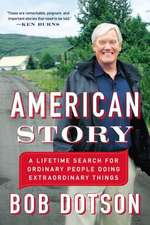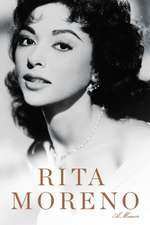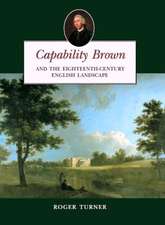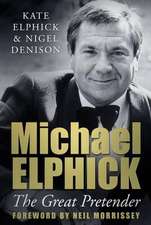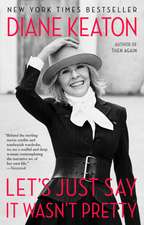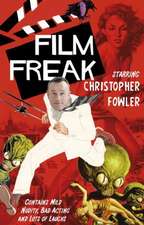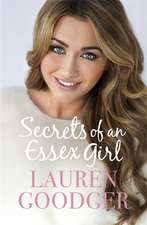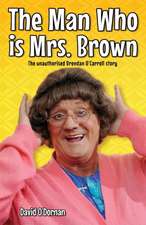Ghost Light: A Memoir
Autor Frank L. Richen Limba Engleză Paperback – 30 sep 2001
Rich grew up in the small-townish Washington, D.C., of the 1950s and early '60s, a place where conformity seemed the key to happiness for a young boy who always felt different. When Rich was seven years old, his parents separated--at a time when divorce was still tantamount to scandal--and thereafter he and his younger sister were labeled "children from a broken home." Bouncing from school to school and increasingly lonely, Rich became terrified of the dark and the uncertainty of his future. But there was one thing in his life that made him sublimely happy: the Broadway theater.
Rich's parents were avid theatergoers, and in happier times they would listen to the brand-new recordings of South Pacific, Damn Yankees, and The Pajama Game over and over in their living room. When his mother's remarriage brought about turbulent changes, Rich took refuge in these same records, re-creating the shows in his imagination, scene by scene. He started collecting Playbills, studied fanatically the theater listings in The New York Times and Variety, and cut out ads to create his own miniature marquees. He never imagined that one day he would be the Times's chief theater critic.
Eventually Rich found a second home at Wash-ington's National Theatre, where as a teenager he was a ticket-taker and was introduced not only to the backstage magic he had dreamed of for so long but to a real-life cast of charismatic and eccentric players who would become his mentors and friends. With humor and eloquence, Rich tells the triumphant story of how the aspirations of a stagestruck young boy became a lifeline, propelling him toward the itinerant family of theater, whose romantic denizens welcomed him into the colorful fringes of Broadway during its last glamorous era.
Every once in a while, a grand spectacle comes along that introduces its audiences to characters and scenes that will resound in their memories long after the curtain has gone down. Ghost Light, Frank Rich's beautifully crafted childhood memoir, is just such an event.
Preț: 119.66 lei
Nou
Puncte Express: 179
Preț estimativ în valută:
22.90€ • 24.89$ • 19.25£
22.90€ • 24.89$ • 19.25£
Carte disponibilă
Livrare economică 31 martie-14 aprilie
Preluare comenzi: 021 569.72.76
Specificații
ISBN-13: 9780375758249
ISBN-10: 0375758240
Pagini: 352
Dimensiuni: 131 x 206 x 26 mm
Greutate: 0.3 kg
Editura: Random House Trade
ISBN-10: 0375758240
Pagini: 352
Dimensiuni: 131 x 206 x 26 mm
Greutate: 0.3 kg
Editura: Random House Trade
Notă biografică
Frank Rich served from 1980 to 1993 as the chief drama critic of The New York Times, and is now an op-ed columnist at the paper as well as senior writer for The New York Times Magazine. He lives in New York City with his wife, the writer Alex Witchel.
Extras
To be an American kid in the fifties was to live in a sparkling, hopeful world where ignorance really was bliss. Parents spoke in euphemistic private codes rather than say anything that might mar the tableaux of contentment they tirelessly constructed for wide young eyes.
We lived in Somerset, where the streets were called Dorset and Warwick and Uppingham and Trent--their very names a farcical affront to reality. The English did not dwell in our bonny Somerset, and neither did their local heirs, the Protestants, who had their own, restricted neighborhoods barely miles away. Somerset, a subdivision built just across the District line in Maryland but not far enough from a city turning black to be among the most desirable of suburbs, was mainly the province of Jews. The houses were not baronial estates but mostly small and new, inhabited by men who had come back from the war to build careers and families and to tend continually to their front lawns and backyards, also small but, as a point of honor, impeccably green. Inside the houses was a riot of wallpaper, some of it depicting scenes more in keeping with the neighborhood's cosmopolitan aspirations. April in Paris? The Weinsteins' dining room was a fanciful rendering of a Parisian boulevard sketched in broad lines and pastels, the kiosks and flower stalls circled by a profusion of dancing pink and black poodles. Even this scene had a recognizable air of American domesticity; it was the cartoon Paree we'd glimpsed in Looney Tunes.
Our universe was as buoyant and tightly sealed as a balloon. After we walked down the hill from the redbrick Somerset Elementary School each weekday at three, we played tag and ball in the street without fear that a stranger or stray car might intrude, secure in the knowledge that our mothers were only one loud shout away and that the worst that could happen to us would be to fall off a bike after the training wheels were removed. The only temptation to danger was provided by a forest that hadn't yet been cleared for new houses; it was a handy laboratory for our earliest experiments with matches, one of which led to the arrival of a fire engine and a rare outbreak of mass parental recrimination in a neighborhood whose kids were not the kind to get into trouble.
The best hope for a daring adventure worthy of our Bobbsey Twins books was the occasional foray into what we took to be a haunted house--any house that had just been built or had just changed hands, and whose new tenants had yet to move in. It was easy to identify these haunted houses: The realtors marked them with red-and-white metal signs planted in the center of their lawns. And it was easy to enter them and commandeer their unfurnished rooms for games of hide-and-seek, all the creepier for the absence of lights and for the reverberant effect on our screams of the bare floors and walls, especially in that fast-dimming twilight just before dinner. We told ourselves there must be ghosts in residence in these houses, that spirits haunted the shadows of the vacant dens and bedrooms and rec rooms with their acrid fragrance of fresh paint.
When darkness fell, we retreated reluctantly from the horseplay in our front yards, each according to his assigned bedtime, until the whole neighborhood was tucked in for the night. But muffled behind the venetian blinds of each house there might still be a flicker of light, a visual echo of the fireflies we collected in Mason jars in our backyards each summer, now emanating from the magical hearth of television.
Sitting before the TV sets in our living rooms--they hadn't invaded bedrooms yet--we watched our neighborhood in a faithful black-and-white replication: the same driveways jutting like tongues from garage to street, the same lawns awaiting the next weekend mowing, the same father with his genial grin and firm but calming voice, the same perpetually amused, slightly distracted, occasionally flustered, but resolutely uncomplaining mother poking around in the kitchen preparing the next meal, the same mischievous but fundamentally good brothers and sisters committing only the most innocuous infractions of their parents' painstakingly codified rules. Sometimes it was hard to figure out where Somerset ended and the TV neighborhoods, with their similarly pastoral place-names, began. If there was a man in the moon--the opening credits of one of our favorite TV comedies, The Honeymooners, promised us one--what would he make of these look-alike families in their look-alike homes staring each night at other look-alike families in their own look-alike homes on small cathode-ray tubes burning through the inky shadows of our living rooms?
Contentment and prosperity smiled back at us from everywhere we looked then, as shiny as our reflections in the voluptuous curves of our parents' bright new cars.
Not unlike Lucy and Desi, Mom and Dad had moved from their small newlyweds' apartment in the city to their first house right after I was born. They had landed in Somerset from culturally conflicting ports of origin. Mom, a grandchild of Russian immigrant families, had been born in Brooklyn--in Manhattan Beach, at the end of Coney Island, in a house just a block from the shore where crates of bootleg liquor were dropped by boat to make their way to New York during Prohibition. But the Depression ended this beach idyll when Mom was seven, sending her father, Nat, and mother, Lil, into the provincial swamp of Washington, D.C. There Nat took what remained of his savings and bought his way into a paper-goods wholesaler of Dixie cups and big brown envelopes and paper clips and glistening mass-produced miracles like Scotch tape. In Washington, the Aaronsons had to settle for raising Mom and her sister in an apartment--on Connecticut Avenue, on the city side of the District line.
By contrast, Dad and his parents, Herbert and Rose, were true Washingtonians. Dad was fonder of telling stories about how his ancestors had fought only dozens of miles away in the Civil War than he was of recounting his own adventures as an Air Force commander in the China-Burma-India theater in World War II. The Riches were German Jews who would have found Brooklyn as foreign as Madagascar. It would have been hard to guess that the Riches were Jewish, since they spoke no Hebrew, ate pork chops, and, in further defiance of their nominal religion's practice, named their firstborn sons after their living fathers: I was Frank, Jr., as Dad's older brother was Herbert, Jr. When Grandma Rose, at our Wednesday-night family dinners at her and Grandpa Herbert's apartment, wanted to identify anyone as Jewish, she lowered her usual booming decibel level--she had been near deaf since Dad was a boy--and spoke cryptically, sotto voce, of "one of us" or "a member of our tribe." I always wondered from whom she was keeping our Jewishness a secret. The only outsider within earshot was Irene, the black maid who had worked for Grandma Rose since before the Depression and who seemed to be more cognizant of Jewish holidays and rituals than her employers were. As my Rich grandparents refused to acknowledge their Jewishness, so they never spoke of anti-Semites or pogroms or Nazis. Each spring, Grandpa would drive his Packard to tour the splendid front lawns in the suburban enclave of Kenwood, where Grandma, having only potted plants and no yard to tend, would cluck over the newly blooming azaleas and cherry blossoms she longed for, never acknowledging the neighborhood's notorious antipathy to Jewish residents, no matter how lofty their provenance.
Dad grew up in a more affluent Washington than Mom's, in a house off Sixteenth Street, the prosperous Jewish district near downtown. His childhood home was only a short trolley ride from the store his great-grandfather had started near Ford's Theatre four years after Lincoln was shot. B. Rich & Sons had been the store's original name, but a bitter fight over which siblings would run it had led to the permanent banishment of some of those Riches from both the business and the family just before I was born. Grandpa, Mom later confided in me, had gone so far as to curse his own mother, his antagonist in the Rich family civil war, even as she was being lowered into her grave. Now the store was known officially as Rich's Shoes--simply Rich's to its customers. Grandpa Herbert had vanquished all dissidents--including Herbert, Jr., who had exiled himself to New York--and now ruled by absolute fiat, with my father, the only son left in the fold, as his unambiguously subordinate heir.
When Dad came back from the war he had asserted his independence by taking a job three blocks away at Hecht's, a department store with a competing shoe department. Though the Korean Conflict put him briefly back in uniform, with an office job at the Pentagon, he had by then rejoined his father at the old store on F Street. The only time I ever heard Dad angry was when he was on the phone with Grandpa at night, arguing about the marked-down price of one shoe or another in a sale. For Polly and me, the store was a treasure chest: Rich's gave its youngest customers comic books and crayons in brightly colored cardboard tubes that looked like rocket ships, and Dad brought home as many as he could carry.
We lived in Somerset, where the streets were called Dorset and Warwick and Uppingham and Trent--their very names a farcical affront to reality. The English did not dwell in our bonny Somerset, and neither did their local heirs, the Protestants, who had their own, restricted neighborhoods barely miles away. Somerset, a subdivision built just across the District line in Maryland but not far enough from a city turning black to be among the most desirable of suburbs, was mainly the province of Jews. The houses were not baronial estates but mostly small and new, inhabited by men who had come back from the war to build careers and families and to tend continually to their front lawns and backyards, also small but, as a point of honor, impeccably green. Inside the houses was a riot of wallpaper, some of it depicting scenes more in keeping with the neighborhood's cosmopolitan aspirations. April in Paris? The Weinsteins' dining room was a fanciful rendering of a Parisian boulevard sketched in broad lines and pastels, the kiosks and flower stalls circled by a profusion of dancing pink and black poodles. Even this scene had a recognizable air of American domesticity; it was the cartoon Paree we'd glimpsed in Looney Tunes.
Our universe was as buoyant and tightly sealed as a balloon. After we walked down the hill from the redbrick Somerset Elementary School each weekday at three, we played tag and ball in the street without fear that a stranger or stray car might intrude, secure in the knowledge that our mothers were only one loud shout away and that the worst that could happen to us would be to fall off a bike after the training wheels were removed. The only temptation to danger was provided by a forest that hadn't yet been cleared for new houses; it was a handy laboratory for our earliest experiments with matches, one of which led to the arrival of a fire engine and a rare outbreak of mass parental recrimination in a neighborhood whose kids were not the kind to get into trouble.
The best hope for a daring adventure worthy of our Bobbsey Twins books was the occasional foray into what we took to be a haunted house--any house that had just been built or had just changed hands, and whose new tenants had yet to move in. It was easy to identify these haunted houses: The realtors marked them with red-and-white metal signs planted in the center of their lawns. And it was easy to enter them and commandeer their unfurnished rooms for games of hide-and-seek, all the creepier for the absence of lights and for the reverberant effect on our screams of the bare floors and walls, especially in that fast-dimming twilight just before dinner. We told ourselves there must be ghosts in residence in these houses, that spirits haunted the shadows of the vacant dens and bedrooms and rec rooms with their acrid fragrance of fresh paint.
When darkness fell, we retreated reluctantly from the horseplay in our front yards, each according to his assigned bedtime, until the whole neighborhood was tucked in for the night. But muffled behind the venetian blinds of each house there might still be a flicker of light, a visual echo of the fireflies we collected in Mason jars in our backyards each summer, now emanating from the magical hearth of television.
Sitting before the TV sets in our living rooms--they hadn't invaded bedrooms yet--we watched our neighborhood in a faithful black-and-white replication: the same driveways jutting like tongues from garage to street, the same lawns awaiting the next weekend mowing, the same father with his genial grin and firm but calming voice, the same perpetually amused, slightly distracted, occasionally flustered, but resolutely uncomplaining mother poking around in the kitchen preparing the next meal, the same mischievous but fundamentally good brothers and sisters committing only the most innocuous infractions of their parents' painstakingly codified rules. Sometimes it was hard to figure out where Somerset ended and the TV neighborhoods, with their similarly pastoral place-names, began. If there was a man in the moon--the opening credits of one of our favorite TV comedies, The Honeymooners, promised us one--what would he make of these look-alike families in their look-alike homes staring each night at other look-alike families in their own look-alike homes on small cathode-ray tubes burning through the inky shadows of our living rooms?
Contentment and prosperity smiled back at us from everywhere we looked then, as shiny as our reflections in the voluptuous curves of our parents' bright new cars.
Not unlike Lucy and Desi, Mom and Dad had moved from their small newlyweds' apartment in the city to their first house right after I was born. They had landed in Somerset from culturally conflicting ports of origin. Mom, a grandchild of Russian immigrant families, had been born in Brooklyn--in Manhattan Beach, at the end of Coney Island, in a house just a block from the shore where crates of bootleg liquor were dropped by boat to make their way to New York during Prohibition. But the Depression ended this beach idyll when Mom was seven, sending her father, Nat, and mother, Lil, into the provincial swamp of Washington, D.C. There Nat took what remained of his savings and bought his way into a paper-goods wholesaler of Dixie cups and big brown envelopes and paper clips and glistening mass-produced miracles like Scotch tape. In Washington, the Aaronsons had to settle for raising Mom and her sister in an apartment--on Connecticut Avenue, on the city side of the District line.
By contrast, Dad and his parents, Herbert and Rose, were true Washingtonians. Dad was fonder of telling stories about how his ancestors had fought only dozens of miles away in the Civil War than he was of recounting his own adventures as an Air Force commander in the China-Burma-India theater in World War II. The Riches were German Jews who would have found Brooklyn as foreign as Madagascar. It would have been hard to guess that the Riches were Jewish, since they spoke no Hebrew, ate pork chops, and, in further defiance of their nominal religion's practice, named their firstborn sons after their living fathers: I was Frank, Jr., as Dad's older brother was Herbert, Jr. When Grandma Rose, at our Wednesday-night family dinners at her and Grandpa Herbert's apartment, wanted to identify anyone as Jewish, she lowered her usual booming decibel level--she had been near deaf since Dad was a boy--and spoke cryptically, sotto voce, of "one of us" or "a member of our tribe." I always wondered from whom she was keeping our Jewishness a secret. The only outsider within earshot was Irene, the black maid who had worked for Grandma Rose since before the Depression and who seemed to be more cognizant of Jewish holidays and rituals than her employers were. As my Rich grandparents refused to acknowledge their Jewishness, so they never spoke of anti-Semites or pogroms or Nazis. Each spring, Grandpa would drive his Packard to tour the splendid front lawns in the suburban enclave of Kenwood, where Grandma, having only potted plants and no yard to tend, would cluck over the newly blooming azaleas and cherry blossoms she longed for, never acknowledging the neighborhood's notorious antipathy to Jewish residents, no matter how lofty their provenance.
Dad grew up in a more affluent Washington than Mom's, in a house off Sixteenth Street, the prosperous Jewish district near downtown. His childhood home was only a short trolley ride from the store his great-grandfather had started near Ford's Theatre four years after Lincoln was shot. B. Rich & Sons had been the store's original name, but a bitter fight over which siblings would run it had led to the permanent banishment of some of those Riches from both the business and the family just before I was born. Grandpa, Mom later confided in me, had gone so far as to curse his own mother, his antagonist in the Rich family civil war, even as she was being lowered into her grave. Now the store was known officially as Rich's Shoes--simply Rich's to its customers. Grandpa Herbert had vanquished all dissidents--including Herbert, Jr., who had exiled himself to New York--and now ruled by absolute fiat, with my father, the only son left in the fold, as his unambiguously subordinate heir.
When Dad came back from the war he had asserted his independence by taking a job three blocks away at Hecht's, a department store with a competing shoe department. Though the Korean Conflict put him briefly back in uniform, with an office job at the Pentagon, he had by then rejoined his father at the old store on F Street. The only time I ever heard Dad angry was when he was on the phone with Grandpa at night, arguing about the marked-down price of one shoe or another in a sale. For Polly and me, the store was a treasure chest: Rich's gave its youngest customers comic books and crayons in brightly colored cardboard tubes that looked like rocket ships, and Dad brought home as many as he could carry.
Recenzii
"This is an absolutely marvelous memoir, the best I have read in recent years. It recounts, passionately and often painfully, the story of an endearing young child from a broken home who finds refuge and finally redemption in the world of theater. It is a thoroughly absorbing tale, told beautifully and without a hint of self-pity. It is everything a literary memoir ought to be." --Doris Kearns Goodwin
"Ghost Light is not so much a memoir as an exorcism. Frank Rich revisits those defoliated battlegrounds we call family and childhood, picks his way through the still live booby traps of memory, and returns if not at peace then at least with the shards of understanding."
--John Gregory Dunne
"Frank Rich's Ghost Light is a stunning book. He manages to weave memories of childhood and theater into a complicated and deeply touching pattern. For anyone who remembers or still believes that their true lives begin when the curtain goes up, Ghost Light will illuminate their passion. This is a beautifully written, honest book. As in the best of theater, any reader will laugh, cry, and be very moved by the end."
--Wendy Wasserstein
"Ghost Light is a superb memoir--rich in anecdote, dense in theme. It's a spellbinding coming-of-age tale, a meditation on art and youth in the '60s, a horror story of urban family life. Deft, raucous, occasionally terrifying--you applaud Frank Rich for his journey and his brilliant skill in delineating it."
--James Ellroy
"Ghost Light is not so much a memoir as an exorcism. Frank Rich revisits those defoliated battlegrounds we call family and childhood, picks his way through the still live booby traps of memory, and returns if not at peace then at least with the shards of understanding."
--John Gregory Dunne
"Frank Rich's Ghost Light is a stunning book. He manages to weave memories of childhood and theater into a complicated and deeply touching pattern. For anyone who remembers or still believes that their true lives begin when the curtain goes up, Ghost Light will illuminate their passion. This is a beautifully written, honest book. As in the best of theater, any reader will laugh, cry, and be very moved by the end."
--Wendy Wasserstein
"Ghost Light is a superb memoir--rich in anecdote, dense in theme. It's a spellbinding coming-of-age tale, a meditation on art and youth in the '60s, a horror story of urban family life. Deft, raucous, occasionally terrifying--you applaud Frank Rich for his journey and his brilliant skill in delineating it."
--James Ellroy
Descriere
"New York Times" writer Frank Rich recounts a boyhood spent in the small-townish Washington, D.C., of the 1950s and early 1960s. Written with humor and an appreciation for the joy that can be found in the most difficult times, "Ghost Light" is a beautiful recollection of a difficult childhood transformed by the magic of theater.

